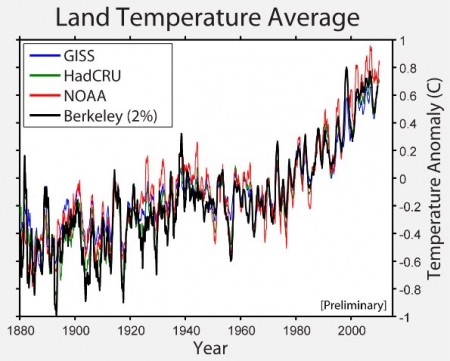Faced with the world as it exists today, every thinking person must experience some degree of mental tension when it comes to climate change. To some degree or another, everyone accepts or rejects the idea that climate change is dangerous and accepts or rejects the idea that we should do something about it. For educated people who pay attention to science, it is no longer plausible to argue that the climate is not changing or that human beings are not causing it. About the last recourse for somebody who thinks climate change is real and caused by people – but who also thinks we should do nothing about it – is raising doubts about how serious climate change will really be. These doubts are often expressed in the form of doubts about climate models.
On the face of it, climate models are a genuine source of uncertainty. What they are attempting to do – project how the climate system will respond to various natural changes and human behaviours across the span of decades – is very challenging. As a result, you might think that we should have a low level of confidence in their projections.
There are several responses to this:
1) Climate sensitivity
The most basic facts of climate change are that greenhouse gases keep energy from the sun trapped within the Earth system, and that trapped energy manifests itself as warming. There is a relationship between the amount of greenhouse gases in the atmosphere (measured in parts per million of carbon dioxide equivalent) and the amount of warming that occurs (measured in degrees Celsius).
The magnitude of that relationship can be determined in a way that doesn’t depend on climate models. We can look back through ice core and sediment samples – along with other pieces of geological evidence of the history of the climate – and examine the relationship between carbon dioxide concentrations and temperature. On the basis of those examinations, we have determined that when you double the amount of carbon dioxide in the air, you raise the temperature of the planet by about 3°C. This estimate has remained constant from the work of the National Academy of Sciences in 1979 to the latest Intergovernmental Panel on Climate Change (IPCC) report.
We also know that burning coal, oil, and gas inevitably produces carbon dioxide. Look at the chemical equations for combustion; carbon dioxide is always a product of the reaction. As such, we know that whenever we burn a tonne of coal, a barrel of oil, or a cubic metre of gas it produces a predictable amount of carbon dioxide that gets added to the atmosphere.
Before the Industrial Revolution, the atmosphere contained about 280 parts per million (ppm) of carbon dioxide. Now, it is over 390 ppm. If humanity keeps burning fossil fuels at the same increasing rate as now, that number will be around 1,000 ppm in 2100. It goes without saying that behaving in this way would warm the planet substantially. Indeed, it would create climatic conditions of a kind never experienced during the 10,000 years during which there have been human civilizations.
Even without looking at models, we have good reason to be worried.
2) Managing risk
Climate models cannot answer all of our questions. They cannot yet tell us exactly how quickly a doubling of atmospheric CO2 would produce a 3°C rise in temperature. Nor can they tell us with certainty which regions will warm most or fastest, or what all the changes in weather patterns will be.
That being said, climate models and the projections that are produced using them give us ample cause for concern. It is going to be challenging enough to manage a world with an estimated 9 billion people in 2050, even without large-scale disruptions in climate.
Also, it is worth remembering that the transition away from fossil fuels isn’t optional. All that can be varied is the timing. Either we can wait until we have burned most of the planet’s fossil fuels before we become serious about alternative forms of energy or we can start that transition early. What we know about climate science argues strongly for the more active approach. The same is true for the many co-benefits that accompany the rapid intentional abandonment of fossil fuels: from reducing air pollution to reducing dependence on countries that export fossil fuels.
Joseph Romm has coined the term ‘climate change delayer‘ to describe someone who accepts that climate change is a real problem but who doesn’t want to do anything about it. Increasingly, these may be the most dangerous people out there. They are still taken seriously by the general public, and they remain politically influential. At the same time, the policies they advocate are incredibly risky for humanity. Insofar as skepticism about the accuracy of climate models helps climate change delayers, it is a problem that needs to be responded to. That response takes two forms: the improvement of our climate modeling capacity, and the explanation of why the knowledge we already have is sufficient to justify action.
The post above is meant to be a modest contribution to the latter effort.
